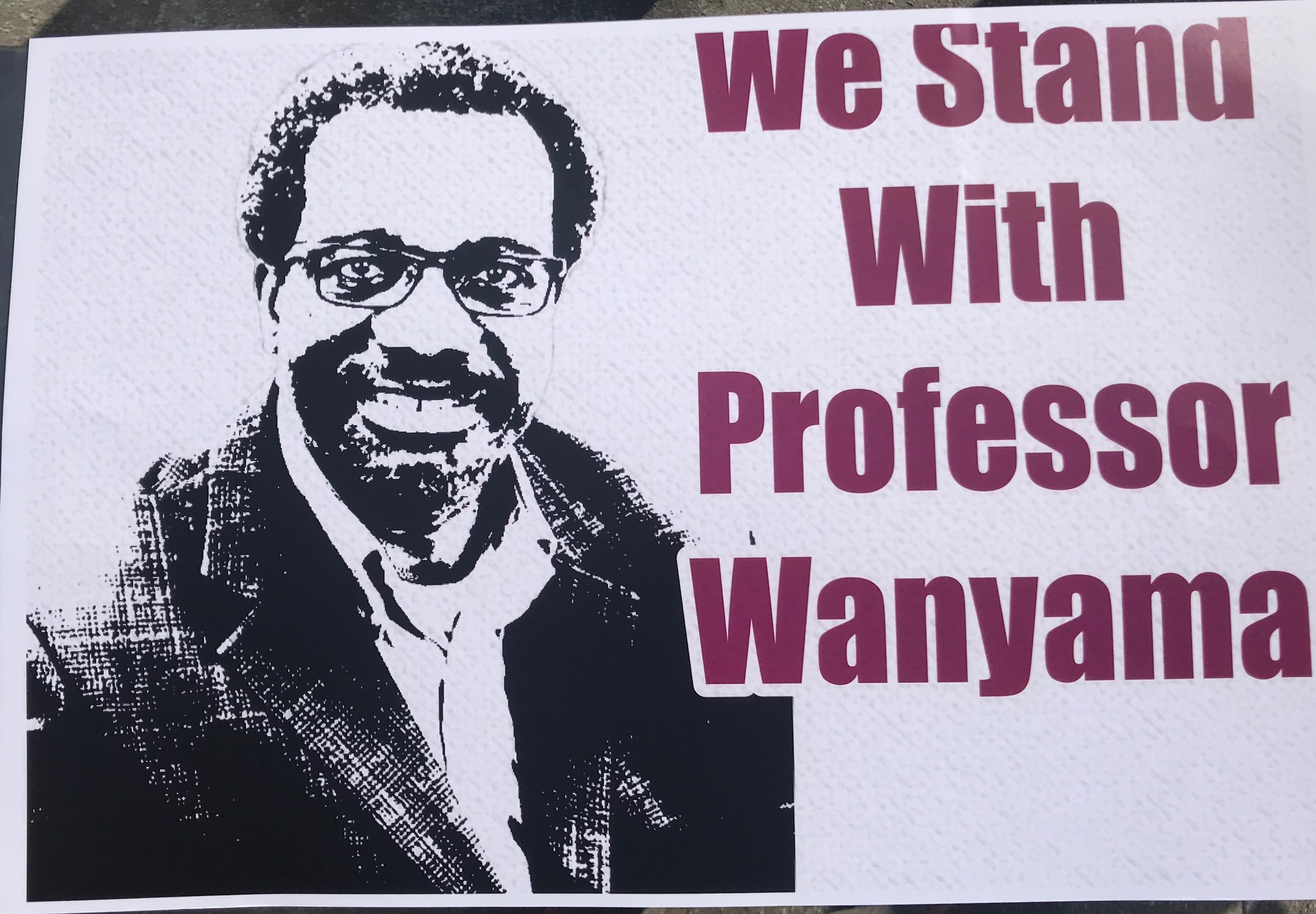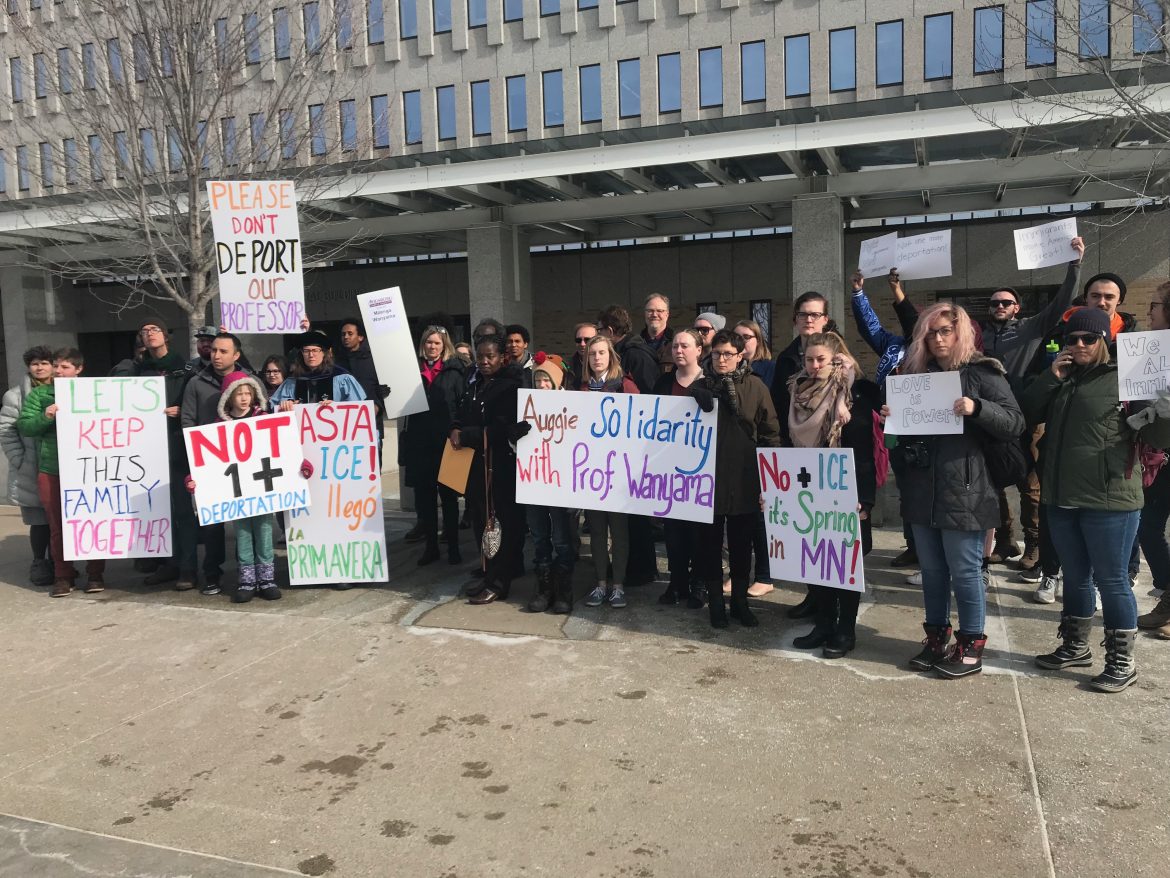

Share
This Friday Augsburg University Professor Mzenga Wanyama and his wife Mary Namalwa Wanyama are to attend their next meeting with ICE.
During their last meeting on Friday, March 9, ICE seized both of their passports, stating that they expect to see concrete plans for the Wanyamas to leave the country. Outside, a gathering with community leaders and supporters, rallied in solidarity with the Wanyama’s. Another action is being planning for their Friday meeting. Supporters are encouraged to attend a noon rally in support of Mary and Mzenga Wanyama at the ICE building, 1 Federal Drive, Fort Snelling.

Rally in front of Federal Building
To date, over 15,000 supporters have signed a change.org petition demanding Dr. Wanyama and his wife be allowed to stay, and roughly 140 supporters have contributed to a GoFundMe page over the past two weeks to help with the cost of representation for the Wanyamas.
The news of the deportation order was a surprise to the Wanyamas. The order has the potential to split the Wanyama family and send Mary and Mzenga to a threatening context in Kenya. In a joint statement the Wanyamas explain,
“We do wish to highlight the fact that we fear returning to Kenya because of the political situation back home. In the different applications for relief that we have made, we have tried to demonstrate that fact to the U.S. government. Last year, Mzenga’s mother was murdered in the town where Mzenga grew up. We hope the immigration officials will take this tragedy into account when reviewing our cases.”
As we have highlighted in prior reporting, the Trump administration has engaged in increasingly targeted immigration enforcement tactics. Those in custody have suffered from extended detentions in mostly private jail facilities.
The Wanyamas see themselves as an example of how these policies impact everyday people and the communities they are apart of.
“Finally, we believe that, in spite of the challenges we have faced in this quest, a clear and unequivocal solution to our situation will emerge at the conclusion of this process,” stated Dr. Wanyama. “We also hope that by sharing our story here, it will shed some light on the current immigration enforcement policies that are hurting not just our family, but so many others across this country.”
Prior reporting explored the impact of the deportation order on Augsburg University students of color. Wanyama has been a key supporter as students of color face the challenges of pursuing higher education among a majority white student population. Two students articulated a sense of disorientation and devastation over the potential loss of Wanyama.
Augsburg junior Destyn Land attended the solidarity rally for the Wanyamas.
“Since I have been there [Augsburg], there has kind of been a lack of support for Black students,” said Land. “And this is one of the only Black professors we have. So a lot of why I am here is because I never ever want to lose this professor.” He said, “Just his presence and the representation that he brings. His encouragement is inspiring to me, and I would truly hate to lose that.”
Fellow Augsburg junior Jhoseline Flores Castellanos explains that during her first semester at Augsburg, she struggled with her writing. It wasn’t until she took a course with Wanyama that her writing and outlook improved.
“Professor Wanyama, being an immigrant like I am, gave me the motivation to keep working hard—turning in drafts,” Castellanos said. “He knows how hard it is and understood where I was coming from.” She is now a social work major. The major is writing intensive, which is no longer a barrier for her. Flores is proud to get consistently positive feedback for the quality of her writing.
Fellow Augsburg junior Jhoseline Flores Castellanos explains that during her first semester at Augsburg, she struggled with her writing. It wasn’t until she took a course with Wanyama that her writing and outlook improved.
“Professor Wanyama, being an immigrant like I am, gave me the motivation to keep working hard—turning in drafts,” Castellanos said. “He knows how hard it is and understood where I was coming from.” She is now a social work major. The major is writing intensive, which is no longer a barrier for her. Flores is proud to get consistently positive feedback for the quality of her writing.
Both students have already been facing the reality of ICE’s strategy of targeted disappearance. Land comments that, “scrolling through my Facebook feed makes me mad as hell, cause it’s like, I have friends who are at risk of being deported.” For some of these friends, their family members have already been deported, breaking up families and eroding the sense of community and stability necessary to pursue college and deal with an increasingly corrosive environment for people of color in the Trump era.
Flores argues that the targeting of a Black professor is a tactical move by ICE because, “they do not want us people of color to succeed.”
For more background on Professor Wanyama’s case, please look at our articles here and here. Workday has reported on the expansion of ICE and its effects on workers; more of that reporting can be found here.

